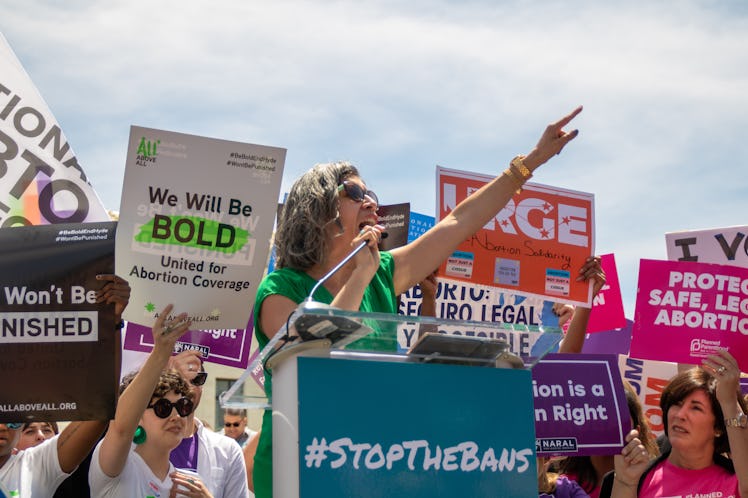
The Tide Is Turning On The Hyde Amendment, Thanks To Women Of Color Activists
Destiny Lopez is the co-director of All* Above All and the All* Above All Action Fund, where she co-leads All* Above All’s work to end the Hyde Amendment. She is a strategist, communicator and thought-leader in reproductive justice.
Six years ago, when women of color leaders came together to launch All* Above All — a coalition of reproductive health, rights, and justice organizations — lawmakers weren’t talking publicly about the Hyde Amendment, a federal policy that bans public health insurance programs from covering abortion care. But in 2019, repealing this harmful policy is not only a politically viable position, it’s a strength major presidential candidates are using to demonstrate their commitment to women and families. Now, after years of fighting against the Hyde Amendment, the tide is finally turning.
Almost every Democratic candidate running for president in 2020 has vowed to do away with Hyde, which prohibits any federal health insurance program, including Medicaid, from covering abortion. States like Maine and Illinois are stepping up to end coverage restrictions and enshrine reproductive health coverage, including abortion, in their local laws. Cities like New York and Austin are also getting in on the action. And a movement — led by women of color like activists with All* Above All — is taking communities across the country by storm, making history by hitting the streets, organizing online, and educating people, elected officials, and candidates for office about the harms of the Hyde Amendment.
In 1976, Congress first passed the Hyde Amendment, banning Medicaid from covering abortion care. It leaves low-income people, who are more likely to be Indigenous, young, LGBTQ, and/or people of color, unable to get the affordable care they need, forcing them to pay out of pocket for a procedure that can cost thousands of dollars. Then-Congressman Henry Hyde, the original architect of the Hyde Amendment, ultimately wanted to end abortion entirely — much like the Trump administration and his anti-abortion cohort today. [Per Elite Daily’s editorial policy, the Elite Daily team reached out to the White House for comment on the administration’s stance on abortion rights and keeping the Hyde Amendment intact, but did not immediately hear back.]
The tide is turning. After years of organizing, activists are starting to win.
More than four decades later, many major presidential candidates running for elected office, federal and state lawmakers, and activists know that the urgency to end this abortion coverage ban has never been greater.
Denying Medicaid insurance coverage of abortion is, in essence, an outright ban on abortion for about one in four low-income women, according to reproductive rights think tank Guttmacher Institute. And as states race to ban abortion, those most hurt will be those who are already marginalized by the U.S. health care system. They are the ones who won’t be able to travel to other states to get care, who won’t be able to take time off work for multiple visits, or who will struggle arranging childcare. The combination of state restrictions and coverage bans can force people to delay care or stop them from getting abortions altogether.
Politicians who impose Hyde don’t only cause people immediate harm, but they create longer term consequences. Research from the University of California, San Francisco, says that when a woman wants to get an abortion but is denied, she is more likely to fall into poverty.
Thankfully, the tide is turning. After years of organizing, activists are starting to win.
This year, lawmakers made Maine the 16th state to cover abortion care through its state Medicaid program. And in Illinois, two years after ensuring their state Medicaid covered abortion, this year passed the Reproductive Health Act, which ensures private insurance coverage as well. This summer, New York City became the first locality to directly fund abortion care in their budget, and members of the Austin City Council passed an allocation to provide practical support, like transportation and child care, for abortion.
Times are changing.
Earlier this year, for the first time ever, members of Congress in both the U.S. House and U.S. Senate introduced the game-changing EACH Woman Act, which would repeal abortion coverage bans and ensure that however someone gets their health insurance or however much money they make, they can get affordable abortion care without political interference. First introduced in 2015 by U.S. Representative Barbara Lee (D-California), the EACH Woman Act now has more than 160 co-sponsors, demonstrating the power and momentum in Congress to end abortion coverage bans.
The public also wants the Hyde Amendment long gone. A new poll of 1,413 voters released by All* Above All on Sept. 30, shows that nationally, 62% of voters support Medicaid coverage for abortion. And the overwhelming majority of voters agree that the amount of money a woman has or does not have should not determine whether she can get health care services, including abortion. More than two-thirds of millennial, African American, and Latinx voters — all of whom are more likely to be impacted by insurance coverage bans — also continue to support Medicaid coverage for abortion.
Times are changing. Candidates for office know it. Federal and state lawmakers know it. And you better believe women of color have long known it.
As an activist of color, I’ve seen women and women of color fighting for each other for generations. Organizations like All* Above All will continue to hit the streets, organize online and in communities across the country, and educate one another about the harms of the Hyde Amendment until it’s gone once and for all.